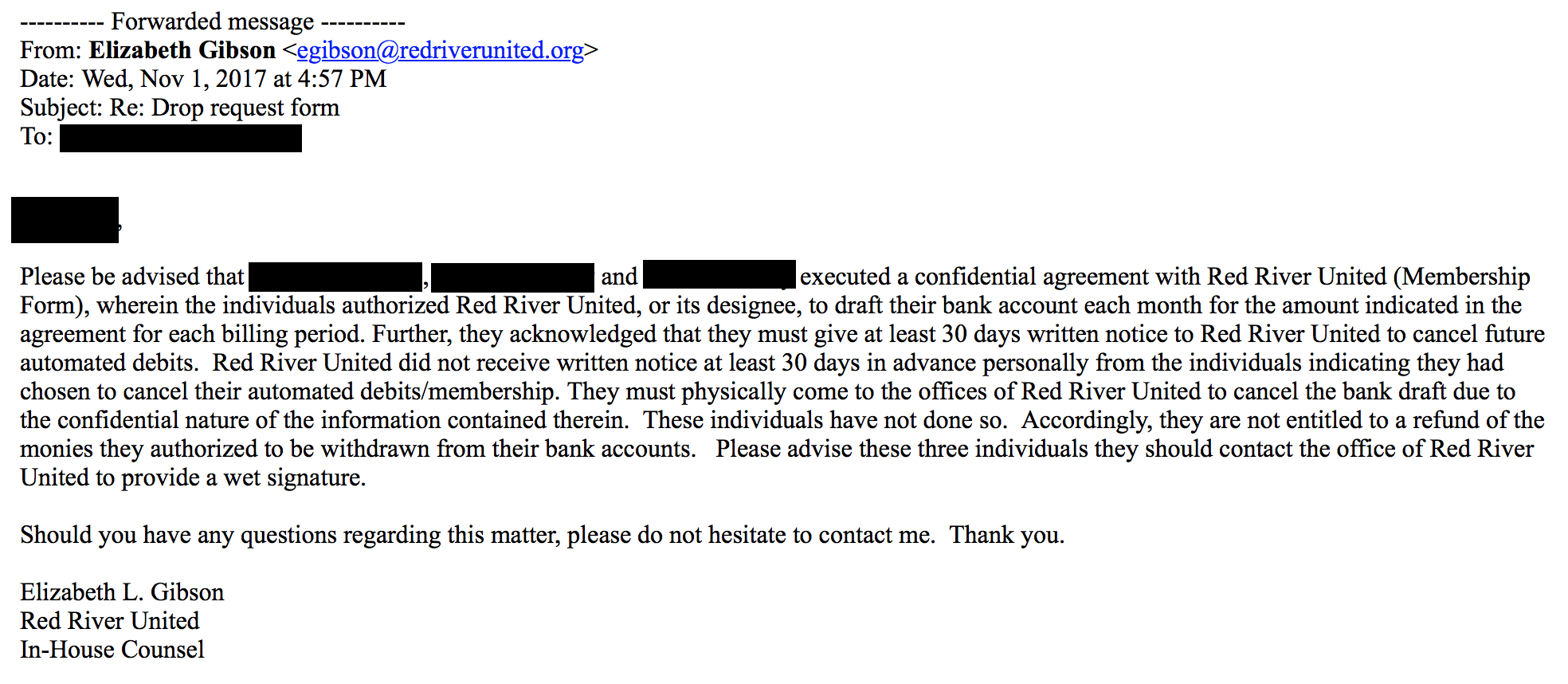Red River United (RRU), the American Federation of Teachers-affiliated union representing educators in Caddo, Bossier, and Red River Parishes, is using bureaucratic hurdles and subterfuge in an attempt to prevent members from leaving the organization.
A reader forwarded me a series of emails regarding three of the union’s current members who submitted a union drop request to Red River officials in October, indicating that they wished to end their affiliation with RRU and stop the monthly deduction of dues from their bank accounts.

The receipt of those forms was acknowledged by the union. Nevertheless, when the three teachers checked with their banks at the end of the month, Red River United had once again deducted dues payments from their accounts. On November 1st, an email was sent to RRU officials notifying them of their mistake and requesting that the union refund those dues to the three individuals.
An emailed response from RRU’s in-house counsel, Elizabeth Gibson, flatly refused to refund those payments, explaining that the three teachers “executed a confidential agreement with Red River United (Membership Form), wherein the individuals authorized Red River United, or its designee, to draft their bank account each month for the amount indicated in the agreement for each billing period.”
She continued:
“Further, they acknowledged that they must give at least 30 days written notice to Red River United to cancel future automated debits. Red River United did not receive written notice at least 30 days in advance personally from the individuals indicating they had chosen to cancel their automated debits/membership. They must physically come to the offices of Red River United to cancel the bank draft due to the confidential nature of the information contained therein. These individuals have not done so. Accordingly, they are not entitled to a refund of the monies they authorized to be withdrawn from their bank accounts.”
Gibson added that the teachers needed to physically go to the union’s offices to provide a so-called “wet signature” in the presence of a Red River United employee in order to officially withdraw from the union and stop the monthly bank withdrawals.

A ridiculous (and dishonest?) response
Gibson’s response is not only ridiculous, but possibly dishonest. It’s also clearly an attempt by Red River United to make it as difficult as possible for current members to dropout of the union.
To start, the union’s “confidential agreement” – i.e., RRU’s membership form – isn’t all that confidential (in fact, I’ve included a copy of it at the bottom of this post). Nowhere on the membership form does it say anything about the requirement to provide a “wet signature” in the presence of an RRU employee to leave the union and stop monthly payments.

Moreover, Gibson’s contention that the three teachers needed to physically go to RRU’s offices to cancel the bank drafts “due to the confidential nature of the information contained therein” is laughable. Anyone who has ever had a subscription to a newspaper or magazine can tell you that you don’t need to go to their offices to cancel it. Plus, there’s nothing “confidential” about the process. All Red River United needs to do is notify their bank to stop the monthly automatic withdrawals for those three individuals. End of story.
So why is Red River United trying to make these three teachers jump through bureaucratic hoops when they clearly don’t want to be part of their organization anymore? I suspect the union is trying to force them to come to their offices so they can pressure them to remain members, which is the kind of behavior you might expect from a dodgy timeshare broker, not a teachers union.
Nevertheless, teachers unions in other states have increasingly employed similar tactics to stem the departure of their members. For example, after Michigan became a right-to-work state in 2012, the Michigan Education Association (MEA) changed their opt-out policy to mandate that teachers withdrawal in August and force them to send their resignation requests to an obscure P.O. box address hidden on their website. The union subsequently refused to honor opt-out requests that were sent directly to MEA headquarters or were received outside of the month of August.

I expect that we’ll see even more of these sort of schemes in the coming months. In September, the U.S. Supreme Court agreed to hear Janus v. AFSCME, a case which argues that requiring public employees to pay agency fees to unions (including teachers unions) is unconstitutional. It is widely expected that the Court will end up striking down the laws in the 22 states that currently mandate agency fees, meaning that teachers unions across the country will soon be scrambling to come up with ways to keep their members from dropping out.
Because Louisiana has long been a right-to-work state, the Janus case should have little direct impact here. At the same time, that’s exactly why Red River United’s efforts to make it as difficult as possible for members to leave their organization needs to be called out. Louisiana’s public school teachers have the right to join a union or not. Therefore, they should be able to leave a union just as easily as they signed up. If Red River United wants to salvage some of its integrity, it should immediately accept the resignation of the three educators in question and refund their dues as soon as possible.


Curious as to @LaFedTeachers ‘s policy on “wet signatures” (I put the term in quotes since the term does not exist). Perhaps they should look into @RedRiverUnited ‘s conduct? That email from their attorney is simply not how people should be treated.